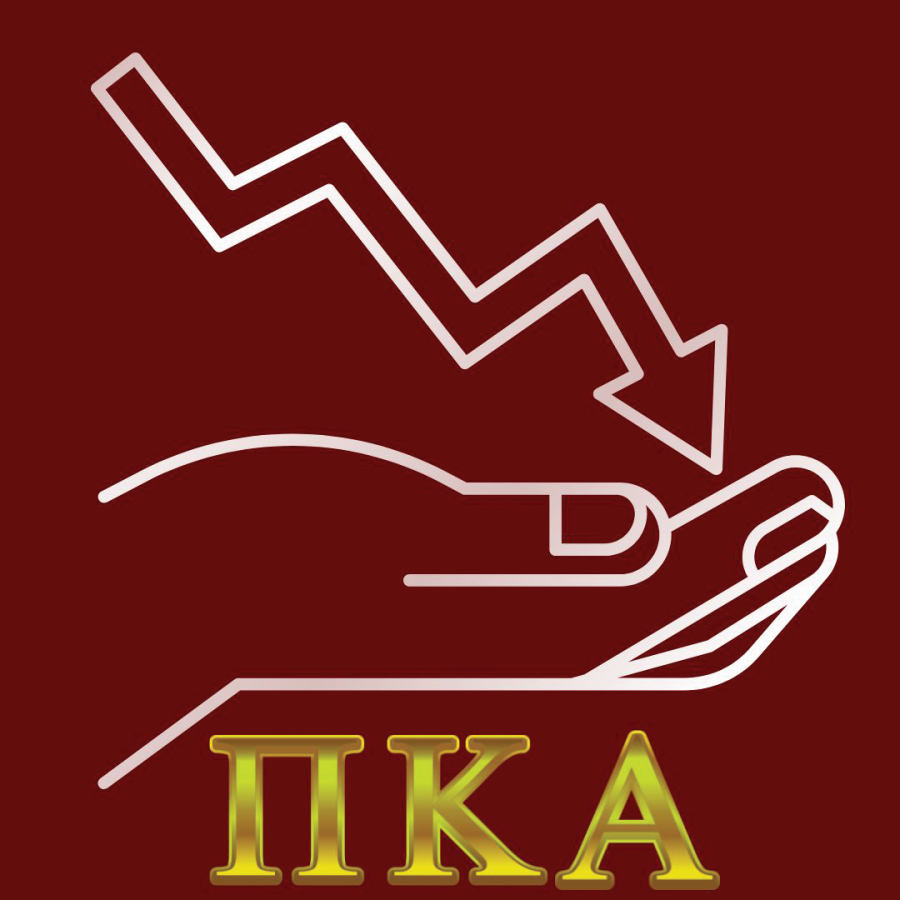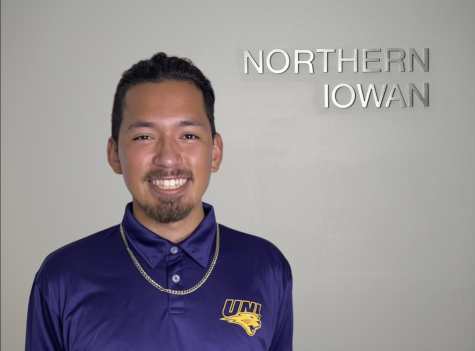The fall of UNI fraternities and sororities
The decreasing number of enrollment at UNI has created a domino effect on student engagement. Many members in Fraternity and Sorority Life feel the impact and struggles to recruit for their chapters.
Jan 26, 2023
Editor’s note: This story was written in the fall 2022 semester.
At the start of the spring semester, the fraternity Pi Kappa Alpha will be shutting down permanently at the University of Northern Iowa (UNI) due to a lack of new members.
The president of Pi Kappa Alpha, Jake Merrill said he believes it was harder to get members this year due to the decreasing number of students enrolling at the UNI.
“The numbers are down, and with school staff there were a lot of issues,” Merrill said. “The fraternity and sorority life advisor, Josh Farris, is a great guy, but with him being only a month into the job during recruitment season the whole school was really behind going into recruitment.”
The current student enrollment population at UNI is 8,949. In 2017 it was 11,907.
Merrill came to the decision to shut down the Fraternity along with the rest of Pi Kappa Alpha members.
“We weren’t told to shut down, we chose to do it because we looked at the state of the campus, Greek life and the state of ourselves and knew it was best. It was a difficult decision to make. Our nationals tried to encourage us to stay open as long as possible but we knew that it would be better for the legacy of pike to shut down now,” Merrill said.
The process to shut down Pi Kappa Alpha began once Merrill reached out to PIKE international with a formal letter. Merrill then announced the decision to UNI’s Fraternity Sorority Life (FSL) advisor and the other chapters were later told the news.
“Part of removing ourselves was so we could set up a plan of action to return,” Merrill said. “We made an agreement with the University to debate how long we will be gone. At that point, the Alumni association for PIKE and internationals will begin to work with the University as well.”
The Pi Kappa Alpha members moved out at the end of the 2022 fall semester and the house will go back to the University to sublease.
Merrill also said that the way people perceive Greek life may also contribute to the decline in Fraternity and Sorority life at the UNI.
“PIKE has a similar image issue if not worse, especially in Iowa. It’s the last standing PIKE chapter in the state because the others were shut down for behavioral issues,” Merrill said. “So PIKE doesn’t have a terrific image overall even though our fraternity is not like that.”
UNI is not the only university seeing a decline in their Greek life. According to a study done at Willamette University (WU) in Oregon, fraternity and sorority recruitment has been down 42% in 2021 compared to the previous year. Only 24 new members joined fraternity and sorority at WU which was a drastic decrease from the 101 members that joined in 2017.
Another study makes a note that multiple universities across the country are also seeing a decline in recruitment. According to Drake University’s student paper, The Times-Delphic Many Drake fraternities and sororities had less numbers than they were typically used to. Anna Sutterer, a member of Drake’s Panhellenic Council, said she was disappointed with the lower recruitment numbers, but felt better seeing other universities had the same issue.
Drake Greek life members believe this is due to COVID-19 and fraternity scandals coming to light at other universities.
Josh Farris, UNI’s FSL advisor, confirmed these reasons are also contributors to why Greek life isn’t doing well at UNI.
“The stereotype Greek life gets, especially fraternities, makes it so people don’t want to join. You tell someone to join a community-based organization and students don’t think anything of it. The minute you call it a fraternity or a sorority people look at you like you’re crazy,” Farris said.
Farris said since COVID-19 enrollment was down because everything was online. Things have just gone back to being fully in-person but it was a difficult adjustment since Farris was new to the position.
“Recruitment was especially hard because there was nobody in my position prior to me full-time. The students weren’t as equipped because they didn’t have access to help they usually did from an advisor,” Farris said.
Cassie Williams, sorority Panhel vice president at UNI, believes Greek life is struggling more at UNI than other universities due to the campus size.
“Enrollment at UNI is down in general which is something that has been hard on a lot of student organizations in terms of membership,” Williams said. “I think part of it ties back to the unfortunate negative connotations that can be associated with Greek life. I think we are the ones that feel the effects of it the most since we’re already small, it’s easier to see the difference.”
Williams said that this negative connotation can also be fueled by movies and media and its portrayal of Greek culture.
“Greek life’s history is a long one and it certainly doesn’t come without controversy,” Williams said. “I do think, however, that Greek life is progressing toward a more positive light.”
“What I think a lot of people don’t realize is how Greek life has changed and continues to change to adapt to a more modern era,” Williams added.
Williams believes UNI’s Greek life could do a better job being more inclusive with the rest of campus.
“I think hosting more campus wide events would be really beneficial to the community,” Williams said. “Laura Harms and I are working with CAB (Campus Activities Board) on a trivia night event hosted by sorority life with the intent of promoting spring continuous open bidding! We mainly want everybody to have the opportunity to understand the FSL community for what it is and to join our community if they choose to.”
In regards to COVID-19, Chase Anderson, former president of Sigma Alpha Epsilon fraternity, said that the pandemic has derailed student engagement even within the fraternity.
“Covid built a habit with a lot of people our age thinking that it’s alright to do a lot of things virtually, and not to be as involved. In the past semester getting involvement from my brothers to try and recruit was difficult,” Anderson said.
Anderson believes that improvement of the atmosphere for UNI’s Greek life will make it more sustainable.
“Other campuses work to build a culture around their Greek life and I think that is UNI’s problem,” Anderson said. “I think with the university’s help and if students were more motivated we could bring that here.”
Williams said she hopes to see UNI Fraternity and Sorority Life flourish in the next five years.
“I think if Greek life isn’t flourishing it will be practically gone. I think we’re at that awkward stage right now where numbers are down, but if we go about recruitment right and marketing right, I honestly do think the numbers can get back up,” Williams said. “I think Greek life is heading toward a more progressive light as well to fit in better with this modern lens.”
According to Farris, the number of new members that joined sororities were at 75 in 2016 and right now it’s at 43. UNI Fraternity and Sorority Life’s goal is to get numbers back around to that area. Fraternities and sororities across the nation are dealing with the decline in new members; UNI is seeing an even more noticeable decline due to its smaller size and decreasing student enrollment.
Merrill said the biggest issue is that nobody is talking about it at UNI.
“It’s a shame to watch a student organization hurting so badly on campus and nobody is talking about it. It’s just a shame the University isn’t doing anything,” Merrill said.
“Knowing this was my last semester in PIKE didn’t make it any easier. Greek life is becoming invisible at UNI,” Merrill said.











Jeff Hammond • Jan 28, 2023 at 11:00 pm
As a Pike alum from Southeast Missouri State, it’s sad too see the chapter disband. Greek life has a lot to offer students that can’t be obtained from other experiences. I have a number of lifelong friends fromm my time in the fraternity and lots of fond memories.